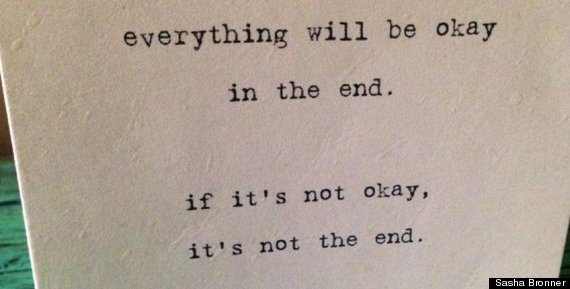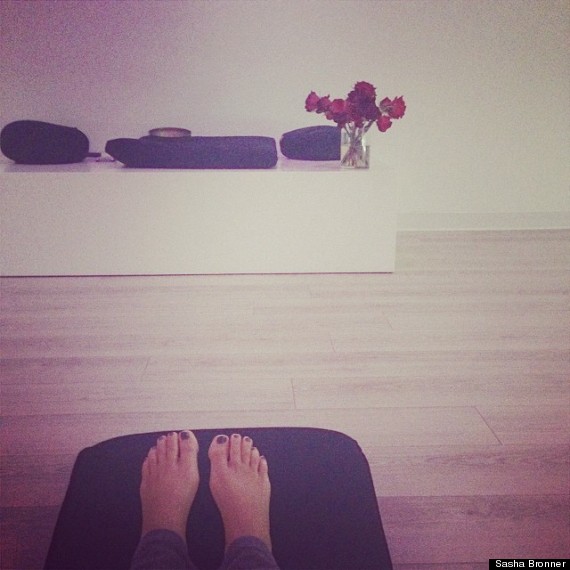
Until I set out to meditate every day for a month, my personal mantra came from a greeting card. I bought it without the envelope because I never planned on giving it to anyone. It read: "Everything will be okay in the end. If it's not okay, it's not the end."
The card has sat on various surfaces in my bedroom for five years and I look at it every day. I have lived with an undiagnosed and baffling immune disorder for nearly all of my 20s. I have seen over 12 different doctors, not including the acupuncturists, nutritionists and holistic doctors. At one point we discussed traveling outside of the U.S. to seek treatment or trying to get into the famed Mayo Clinic in Minnesota. It's an elimination game, and after crossing off every autoimmune disease on the list, even my doctors scratched their heads at the welts all over my body, my fatigue and the clumps of hair I would sometimes find in the shower.
Some months I let slip away in a daze as we tried combinations of drugs or I tried to just cope by putting one foot in front of the other so that I could keep my job, my relationships and my life in some form of order.
So on some days, those 15 words -- "Everything will be okay in the end. If it's not okay, it's not the end" -- were the only thing that could make me feel better. That mantra brought calm into a body that was sometimes raging out of control.
After years of trial and error with different medications, very recently my doctor found a treatment that seems to be working for me. I get shots once a month and have been able to taper off all the other medications I was on, which at one point, was eight different drugs. This is the healthiest I have been in many years. But as I have felt my body start to return to a state of normalcy, my mind has felt like it's been running a marathon; a long loop that's left me feeling impatient, angry and oftentimes deeply sad.

In January, after an especially difficult year, and before we could tell if my immune injections were working, I decided to spend New Year's and my 29th birthday alone at a five-day silent meditation retreat in Big Sur, California. It was there that I first learned to meditate and I felt more peace and calm than I had in many years. I drove back to L.A. along Highway 1 with a lightness in me; an amazing smile on my face.
But back at home, I didn't meditate at all. It was too hard without a teacher or without the other people in our class, and honestly, I didn't really remember how to do it.
Aching to find something meaningful to do in the last several months before I turned 30, and knowing how good I felt in Big Sur, I decided to sign up for a meditation challenge at a new studio called Unplug Meditation in Los Angeles. The goal was 20 meditations in the span of 30 days.
I had access to all classes and all teachers. Like a yoga studio, I could try different types of meditation and see what I liked the most. On day five I decided to try a mantra meditation class because I didn't know what that meant and I thought it sounded sexy.
The teacher told us that it was perfectly okay to let our minds wander. There is no such thing as a distraction. We were going to repeat a generic mantra inside our heads and whenever we noticed ourselves getting lost in thought, or going on "mental excursions" as he called them, we would very casually, almost nonchalantly come back to the mantra.
Very little effort was required. It was okay if we forgot the mantra or even forgot what it was we were doing. If we found ourselves falling asleep, "this is also correct," the teacher said. This was fatigue unwinding from the body.

He then said the mantra out loud -- a meaningless word -- which he repeated a few times. No sound can be uttered that doesn't mean something in some language, but we were told that this word had no intended meaning.
When I first heard the mantra, it felt like something carbonated had leaked inside my body and I had to stop myself from bursting into laughter or bursting into tears at the same exact moment. I had a wide grin on my face for the first several minutes of meditation and I had no idea why.
We continued with our eyes closed, repeating the mantra for about 20 minutes. When I opened my eyes at the end, it felt like I was on a drug. It was so different from every other time I had meditated.
The next morning I decided to sign up for a Vedic meditation (a version of mantra meditation) workshop that my teacher was leading. We met for four days and learned the intricacies of the practice. I was given a personalized mantra that I now use when I meditate. I don't know the meaning of the mantra or how it's spelled, and some days I like the sound of it and some days I don't.
We were encouraged to start practicing twice a day for 20 minutes, once in the morning before breakfast and then again sometime before dinner. I took the schedule to heart and by the end of July, between my Vedic practice and my studio commitment, I had sat down to meditate over 50 times.
I had many questions throughout the month, but the one that nagged at me and just wouldn't go away was this: If there's no such thing as a distraction, and if we are allowed to let our minds wander, then how is this different than just sitting down for 20 minutes and thinking?
Each teacher had a different response. But what it comes down to, really, is the intention. When I meditate, I have the intention to sit down and practice. To sit down and repeat the mantra. And this simple intention actually becomes a bigger intention to let go of all expectations about what my meditation should be.
That doesn't mean I don't have dozens upon dozens of thoughts. And that also doesn't mean that I'm meditating unsuccessfully. But when I notice that I'm off thinking about something else, I drift back to the mantra, and that process allows my mind to settle. There are many different kinds of meditation in the world and I can only talk about the kind that I have learned.
We have anywhere from 60,000 to 80,000 thoughts a day. Sitting down for 20 minutes with our eyes closed is not going to stop us from thinking. Hearing this was a relief for me, because I let my mind wander often. All the time. Some metaphors that teachers used to describe our brains during meditation go something like this: our brain is like a train station and all of our thoughts coming and going are like trains passing through. We can choose to get on the first train that comes by, or not. We can sit and watch the trains come and go, observing our thoughts, noticing that we are having thoughts.
Another teacher said we are like a great big mountain and the thoughts passing around us are like clouds in the sky. The mountain does not move, the clouds around it do.

The author Donna Tartt refers to a stoic character in The Goldfinch as a "planet without an atmosphere." It's a phrase I love and one that I returned to during my month of meditation. But we are planets with atmospheres. Thoughts and feelings pass through, sometimes at great speed, and other times slowly, or with greater or lesser density.
Some days I felt all over the place; unable to settle in, muscling my way through the mantra and itching for the 20 minutes to be up. Other times, the 20 minutes would fly by so quickly that I would open my eyes a little freaked out.
Some days my meditation would be full of random questions, like are Jon Stewart and John Oliver faithful to their wives? What does Paul Simon eat for breakfast? Is there vitamin C in the rind of an orange or just inside? Does the soul age and change with us throughout our lives, or does it always stay the same?
During my meditation month, I took the practice out into the world with me -- some days practicing at the beach after swimming with friends, or lying down in a grassy park under a great big tree after getting my immune injections at the doctor. I meditated sitting cross-legged on the trunk of a car in the middle of the Mojave Desert before a night of camping and I meditated on a porch covered from the pouring rain on vacation in North Carolina.

Occasionally I had these luscious, thick meditations that dripped like honey through my brain. I found this pocket in between thoughts, when the mantra would echo off the walls of my brain slowly, lulling me into a wave of calmness like I was underwater but still breathing.
During one meditation, it felt like the teacher vanished from the room. Another time, it felt like I vanished. One day I suddenly noticed the difference between saying the mantra in my head and hearing it. And for whatever reason, that felt like a breakthrough of some sort.
But no two meditations are the same, and every single time I sat down has been a different experience. The only constant so far has been how I feel in between meditations.
I smiled more in the month of July than I had in many months before. I woke up with an unexplained giddiness, this strange excitement that I couldn't identify. My thoughts and emotions felt less compressed, like there was more air in between everything.
In many ways it's like I am lighter, like I have shed a layer. Or like my skin has become rubbery and slick. Things stick to me less.

I wonder what my 20s would have been like if I had learned to meditate sooner. I wonder if my health would have been different or if I would have been able to handle it all better. Or if maybe all of this was part of a grand order of things. I have room in my life now where I didn't before.
My mantra has shrunk from those 15 words on a card to just one, and the greatest lesson I learned in my month of meditation was how to let go. How to let go of 14 other words that I no longer need, how to let go of a disorder that has defined me, how to let go of all the passing thoughts, how to let go of people I held too tight.
In some ways, the experience of meditating every day has sort of felt like falling in love. There are butterflies and excitement and you want to tell everyone about it. You can't wait to see each other and even though it's so hard to wake up 30 minutes earlier in the morning to sit down and meditate before coffee, you do it. Making room for this new great thing in your life doesn't require effort and it doesn't feel like a sacrifice. It feels like I have found an anchor. But unlike love, it is not another person. The anchor is me.
This post is part of the Third Metric Challenge series. We invite you to find a creative way to incorporate the pillars of the Third Metric (well-being, wisdom, wonder and giving) into your life and share your story. To submit a post, email thirdmetric@huffingtonpost.com.